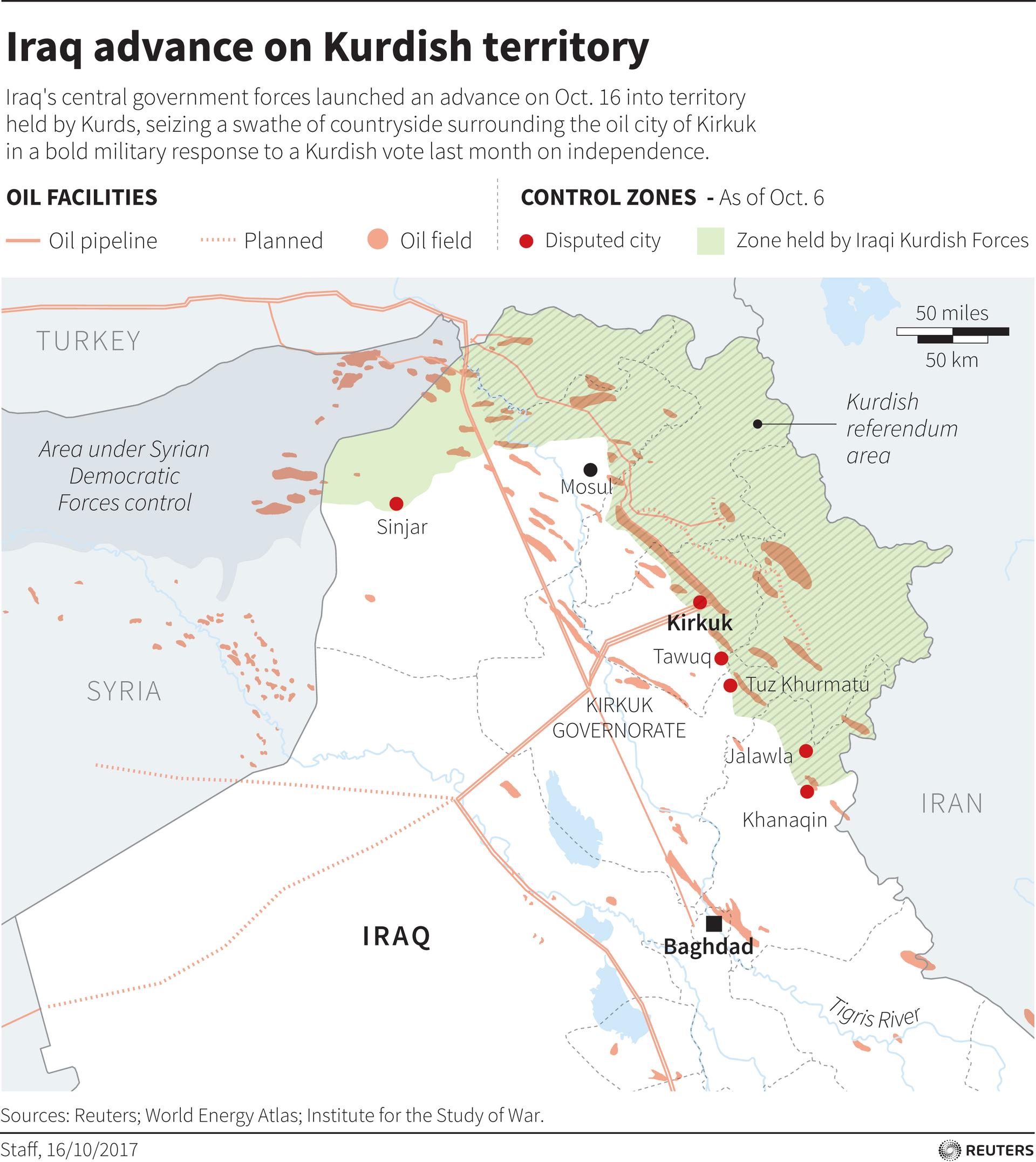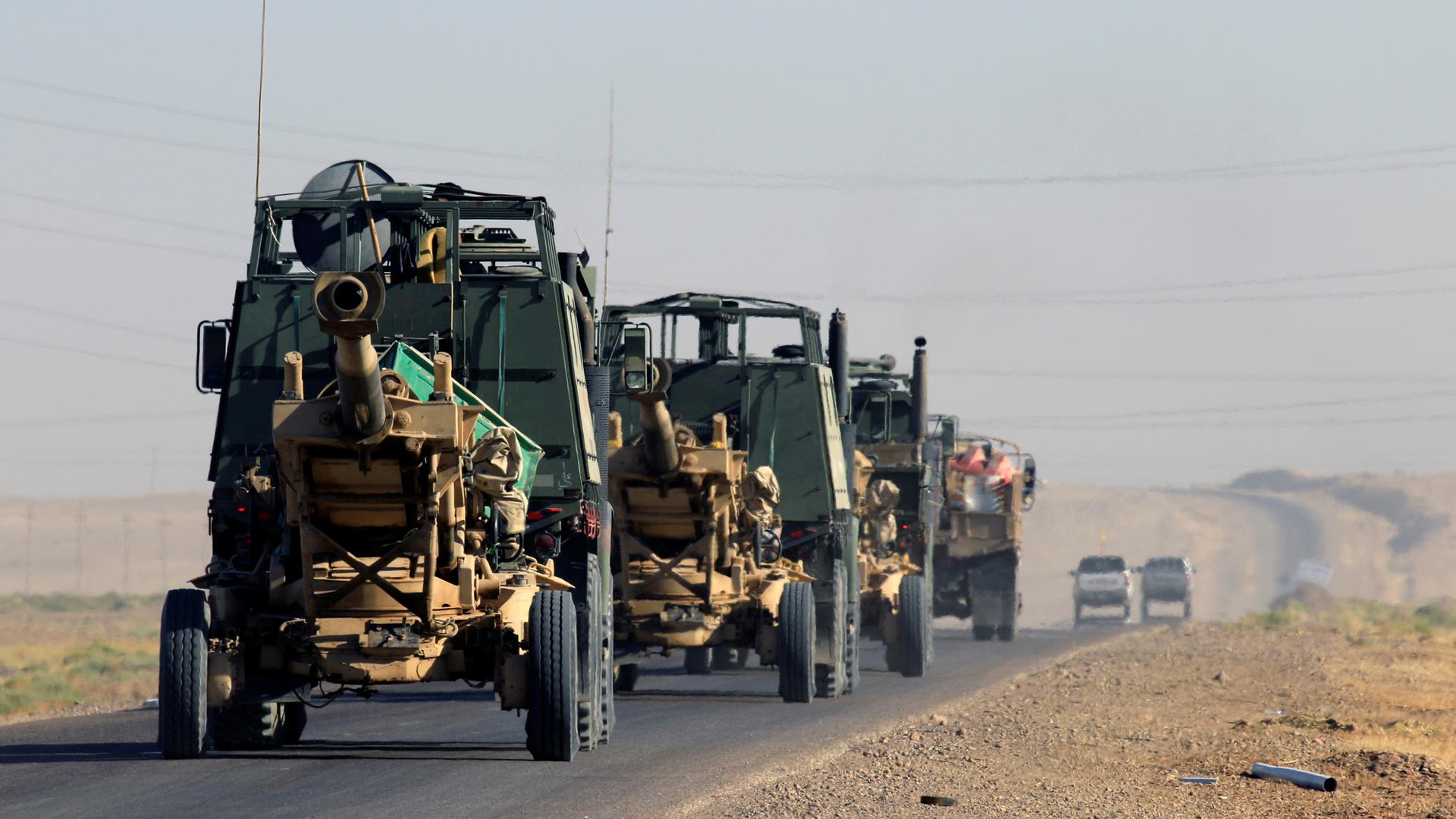Iraq forces take oil fields dashing Kurdish dreams
Artillery belonging to Iraqi army are seen southwest of Kirkuk, Iraq, October 17, 2017.
The Kurds withdrew from several locations Tuesday without a fight after federal government troops and militia entered the city of Kirkuk and seized the provincial governor's office and key military bases in response to a Kurdish vote for independence last month. The events over the last several days in the disputed northern province of Kirkuk could demolish Kurdish hopes of creating a viable independent state.
The fields accounted for around 250,000 barrels per day (bpd) of the 650,000 bpd that the autonomous Kurdish region exported under its own auspices and their loss deals a huge blow to its already parlous finances and its dreams of economic self-sufficiency.
Iraqi forces took down the red, white, green and yellow Kurdish flags that had flown over the pumping stations of the Bai Hassan and Havana oil fields and raised the national flag, an AFP photographer reported.
The fields' Kurdish technicians had halted production and fled on Monday evening ahead of the entry of federal government troops and police.

Police Colonel Ahmed Modhi hailed the restoration of federal control over the two fields, which the Kurds had taken over during the chaos that followed ISIS' lightning advance through northern and western Iraq in 2014.
"It's a national resource and it belongs to Iraq, just like the natural resources of the country as a whole," Modhi told AFP.
Oil exports via a pipeline through neighboring Turkey account for a significant share of the autonomous Kurdish government's revenues.
They have always riled Baghdad which views them as a breach of the constitution that makes them a federal responsibility.
'End of the dream'
The autonomous Kurdish region is already going through its worst economic crisis after Baghdad severed its air links with the outside world and neighboring Iran closed its border to trade in oil products.
"With the loss of these fields, Kurdish finances have been cut in half," French geographer and Kurdistan specialist Cyril Roussel told AFP.
"It spells the end of Kurdistan's economic self-sufficiency and of the dream of independence."
Related: US allies turn their US guns on each other in Iraq
Roussel said that without the revenues from Kirkuk oil, the Kurds would never have set in motion the September 25 referendum that delivered a resounding 'yes' for independence but at the cost of triggering military intervention by Baghdad.
"It was only after the annexation of the two Kirkuk fields in July 2014 that Kurdish president Massud Barzani started to talk of independence. Before, he spoke only of autonomy."
Kirkuk lies outside the autonomous region but is one of a string of historically Kurdish-majority territory that the Kurds have long wanted to incorporate in it against the wishes of Baghdad.
Kurdish forces took over many of them in 2014 when units of the Iraqi army disintegrated in the face of the jihadists' lightning advance.
Yazidi massacre town falls
But since entering the city of Kirkuk on Monday, government forces have moved to retake them one by one.
On Tuesday, troops and militia entered the Yazidi Kurdish town of Sinjar after peshmerga forces withdrew without a fight, the Hashed al-Shaabi paramilitary force said.
They also entered the town of Khanaqin, on the Iranian border, and three other towns in Diyala province northeast of Baghdad, a provincial security official told AFP.
Sinjar, in the northwest, is infamous as the site of one of ISIS' worst atrocities, when it killed thousands of Yazidi men and abducted thousands of women and girls as sex slaves in August 2014.
Tens of thousands of civilians fled into the nearby mountains in appalling conditions, helping to trigger US intervention against the jihadists.
The Yazidis are Kurdish-speaking but follow their own non-Muslim faith that earned them the hatred of the Sunni Muslim extremists of ISIS.
'Betrayal'
Kurdish forces captured Sinjar from ISIS in 2015 and the town's loss is a symbolic blow for the Kurdish leadership.
Ten peshmerga fighters were killed as they exchanged artillery fire with the army before it entered Kirkuk on Monday but otherwise its advance has been largely bloodless.
That has been helped by a sharp division within Kurdish ranks over last month's independence referendum.
Peshmerga forces loyal to the Patriotic Union of Kurdistan, historic rival of Barzani's Kurdistan Democratic Party, withdrew under an agreement with Baghdad, officials said.
The KDP accused the PUK of "betrayal."
The PUK, the party of Iraqi President Fuad Masum, had supported a UN-backed plan for negotiations with Baghdad in exchange for dropping the referendum called by Barzani.
But KDP peshmerga too pulled out without a fight in the face of the federal government's advance. It was they who abandoned Sinjar and the two Kirkuk oil fields.
In Kirkuk, the army's 12th Division was able to restore some of its wounded pride from the collapse of 2014, as its armored cars entered its former K1 base in the northwest of the city on Monday.
On Tuesday, as it became clear that the feared bloodshed was not going to materialize, some of the tens of thousands of Kurdish residents who had fled the city began to return to their homes, security sources said.
by Ahmad al-Rubaye with Sammy Ketz/AFP
